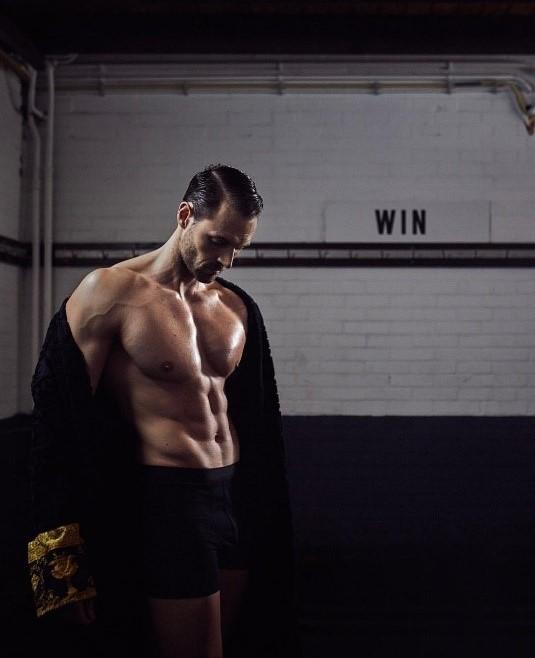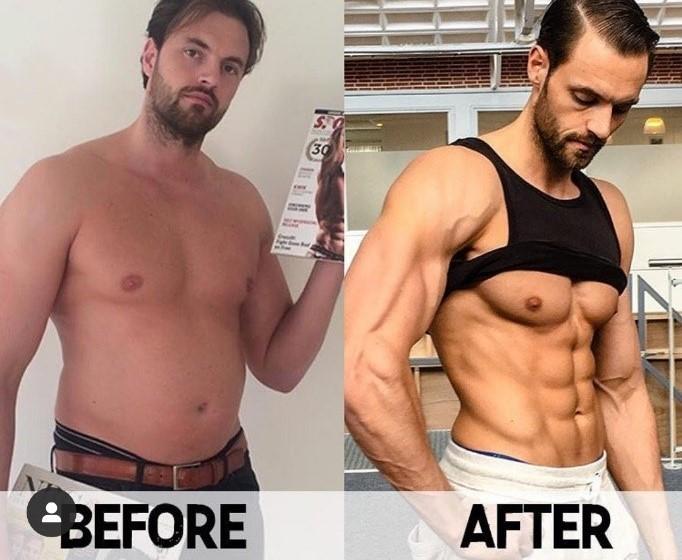
Joel Beukers gives his own twist to Foucault's biopower
Joel Beukers has been giving his own twist to Michel Foucault's biopower. He uses his social media platforms to share his idea of "the perfect body", while at the same time telling his audience to enjoy life and not be too obsessed with the ideal of the perfect healthy life, thus normalizing fitness with some enjoyment and abnormalizing the pure obsession with fitness.
Social media celebrity Joel Beukers
Joel Beukers, also known as the fitness guru or the “Golden Boy” (Kraak, 2018), is an influencer on YouTube. He currently has a following consisting of around 88.000 subscribers. Over the last four months, he accumulated over 2,3 million views (with an average of about 80.000 views per video). He uses the video platform to position himself in the world of fitness: this includes his exercises, his body and his products. He is active on Instagram as well, where he has over 200.000 followers. Additionally, he sells his own fitness supplements, which can be used by both men and women to build muscles or lose weight.
Joel is mostly known for his rude jokes, his macho behavior and the exaggerated screaming on his video blogs (vlogs). People often call him crazy, but at the same time appreciate his energy. He is hardworking, both in promoting his company Clean Nutrition and in building his own physique. He also has a girlfriend, who helped make his company into a great success. When we look at Joel’s social media channels, we see that the goal of achieving a perfect, healthy human body is a recurring theme.

Joel Beukers promoting one of his challenges using pictures of his muscular body
Origins of the obsession with fitness
The obsession with the perfect human body may be explained with the concept of “biopower”. According to Michel Foucault, biopower is a dominant system of social control. It is about how power manifests itself in the form of daily practices and routines, with which individuals practice self-surveillance and self-discipline, therefore subjugating themselves (Pylypa, 1998). Individuals seemingly “oppress” themselves by partaking in habitual daily practices such as self-regulation of hygiene, health and sexuality. Foucault’s concept also sheds light on how both the individual and the society play a role in encouraging such practices.
The aspiration to a healthy lifestyle is for a large part encouraged by fitness celebrities, including Joel Beukers. Personalities like him have gained great popularity in the 21st century, especially because of the breakthrough of social media. The visual culture on popular platforms like YouTube and Instagram, on which Joel is most active, has made it easy to share the idea of what a “perfect” body looks like, and has led to more people wanting to imitate a lifestyle of fitness.

Joel Beukers using Instagram's visual culture to show off his fit body
This explains why fitness models are so popular in this day and age. Looking at behaviors associated with physical fitness has led to the creation of “docile” bodies (Pylypa, 1998). In other words: people have become willing to follow the examples of the perfect bodies they strive for, and accepting of other people’s influence on how this is achieved.
Pylypa (1998) explained the obsession with the fit body mostly from the perspective of female fitness, but it may be useful to apply this more generally now. According to her, there are two different discourses that led to this obsession: a health discourse and a discourse of media and advertising.
The health discourse includes both knowledge produced by the medical field and the popular science discourse on health. The fit and thin body is presented as healthy and normal, while the overweight or “unfit” body is seen as unhealthy and abnormal. Throughout recent history, the definition of what counts as a “normal” body has thoroughly changed. This change is described by Schwartz (1986) as an increasing restriction. According to Schwartz (1986), the concern with weight gain increased substantially in the first half of the 20th century. However, this did not mean the general public suddenly got fatter; it instead meant that people’s attitudes towards unhealthy bodies became more negative. While early charts about height and weight were based on population averages, they gradually changed to portray an ideal standard instead. This development happened in the absence of a medical basis for evaluating this as the "ideal" body (Schwartz, 1986).
The other type of discourse stems from the media and advertising industry, which in the 21st century includes platforms like Instagram. This discourse not only regards the fit, thin body as healthy, but also adds that it is the standard of beauty and sex appeal that must be lived up to. This industry also considers the unhealthy body unpopular and ugly.

The “before and after” comparison (implicitly) shows the non-muscular body as unfit and the muscular body as fit
Closer look at Joel’s personality and behavior
To better understand the link between Joel’s behavior and these theoretical concepts, we may go back to the very beginnings of his company. Joel tried to sell pre-workout supplements, but was unsuccessful at first (Kraak, 2018). He started to understand that he had to be distinctive. Meanwhile, social media started to increase in popularity in the 21st century, But in the beginning stages of this process, there were no videos in his field of specialty. In 2012, Joel started to sell his product on social media channels like YouTube.
Several activities keep Joel busy: he releases videos to promote his product and he shows off his body, along with tips and tricks for fitness exercises. He also has his own app in which he gives additional tips and tricks.

"Tips for a bigger chest": A fitness instruction video on Joel Beukers' YouTube Channel
One of Joel’s personality traits is his sometimes over-the-top positivity, characterized by multiple catchphrases that he uses in his videos. Both on YouTube and on his app, Joel tends to scream often, usually to humorous effect. He admits this screaming is exaggerated, but he uses it to support and encourage his following. Joel's loud personality in a way resembles that of the Dutch ‘positivity guru’ Emile Ratelband, who more recently has been in the news because of his claim that he is twenty years younger than he actually is. With his trademark expression ‘Tsjakka’, Ratelband became a motivational coach and famous media personality. Screaming like Joel occurs frequently in both the world of fitness and the motivational scene. Male fitness models will often yell when showing off their body, while motivational speakers such as Ratelband often resort to catchphrases and über-positivity in their speeches. Another example of this is the popular "Just Do It” video by Shia LaBeouf, which went viral in 2015 and quickly became a meme after its release.
Joel Beukers' optimism originated in his youth. He played rugby, but was once caught with performance enhancing drugs in his blood. Joel used multiple supplements next to his training schedules, which he later claimed had “loads of rubbish” in them, causing him to fail his drugs test. He always knew that there had to be a product without illegal substances that gives people the same level of energy. In the meantime he was determined to start his own company. His own brand of nutritional supplements, Clean Nutrition, was eventually created in 2012 after Joel was banned for two years because of the performance-enhancing drugs. “Supplements without rubbish or added sugar, but with a basis of natural products,” is how Joel describes his own product (Koningsberger, 2017). When Joel started making his videos, he did so to prove that his product (Clean Nutrition) actually worked, by showcasing people losing weight and getting a more muscular body. Additionally, he gave fitness tips to try to increase the sales of his products. At the same time, he developed the mobile application which featured a fitness program and many of Joel’s motivational expressions.
Joel often keeps himself optimistic by screaming words to himself: “money”, “Lamborghini” or “Maserati”. Possessing those items was the aim of his life, but he knew that those words alone would not give him his breakthrough. His eyes were opened when he met a 40 year old man who frequented the same gym as him. This man always screamed: “VOOR GOUD!” (In English: “go for gold!”) This is a pun because gold can mean money and ‘goud’ can mean trying to be the best. Joel often uses loud yells to stay positive and to challenge himself and his audience. Well known are: “Grow well (Groei lekker)”, “Go for gold (Voor goud)”, “Pure profit (Pure winst)”, “We break the place down (We breken de tent af)”. He also uses the word ‘stroll’ (flaneren) a lot. Such cries are meant to impress his audience.
At one point Joel did not have a house, but when he finally had plenty of money he bought a Lamborghini instead of a house. This also led to people calling him crazy, but Joel had a reason for this purchase: it was pure marketing. As he had intended, he received a lot of attention for this decision, with which he could grow his brand. The purchase was an investment.
Explanation for Joel’s success
Joel Beukers’ training program called “VOOR GOUD” (“FOR GOLD”), is not something novel or groundbreaking. Training programs existed for years before Joel started his. However, while Joel’s ideas do not seem new, he manages to conduct his business successfully. The main reason may be the way he presents himself: as the loud, self-made, positive fitness guru, motivating people who look up to him to become a better version of themselves. More importantly, Joel's successful entrepreneurship has been enabled by the evolving obsession with the human body, helped along by the current technological possibilities. The combination of society’s changed attitudes towards fitness, Joel’s background, and his videos, training programs and supplements, is why his business is so successful.
Therefore, it is to be expected that most people do take Joel Beukers seriously, but that those people also realize that he is exaggerating on purpose in all of his videos. That is exactly what he wants; he aims to be distinctive compared to others, even superior. Joel became rich and has a very muscular body, which means he is at least doing something right.
Interestingly, Joel keeps his audience positive by telling them that they don’t actually have to be a “fitboy” or “fitgirl”. In his videos, he often encourages others to get drunk in the weekend and just enjoy their lives. Joel has admitted that his image and the ‘scoops’ that became famous in his videos resemble the rave culture, since both the scoops and the music and drugs associated with rave parties give people a boost. Joel's motto is “Inkakken is bijpakken” (loosely translated as “take some more when you’re slowing down”), which perfectly alludes to the wisdom of rave culture. The picture below illustrates this well: in one of his videos, he lets the worlds of fitness and rave culture collide.

Still of a YouTube video titled "How do I prevent muscle loss at a rave?": The interesting combination of promoting healthy and unhealthy living.
Joel Beukers and self-discipline
Linking Joel Beukers’ behavior to the aforementioned discourses and the concept of biopower leads to various results. For one, he spends much time portraying his “ideal” body and rich lifestyle through images and videos. On top of that he catches the public’s attention by doing outlandish things and making unexpected choices. All of this is characteristic of the modern media and advertising discourse. Showing his fitness routines, as well as keeping the audience motivated in a humorous manner in his social media appearances, are also quite clearly examples of the self-surveillance and self-discipline practices that Foucault talked about.
Showing his fitness routines, as well as keeping the audience motivated in a humorous manner on his social media, are also quite clearly examples of the self-surveillance and self-discipline practices that Foucault talked about.
Thus, he seems to create a contrast between fitness practices and his behavior outside of the gym: in addition to his serious training he encourages partying and drinking in the weekend, as well as doing things like taking high amounts of his supplements with little to no water. Joel thus appears to encourage several behaviors that can be seen as bad for one’s health. These could possibly lead to more “unfit” lives, which modern society has turned increasingly against, if overdone and copied too extensively by the audience. This would of course be the opposite of the average fitness influencer’s main goal: making people have healthier bodies.

A "scoop" being put straight into the mouth
Ultimately, Joel is always putting his energy on display. On the one hand he uses this to promote good health, but on the other he gives his own twist to biopower: he tells the audience to enjoy life and not be too obsessed with the image of the perfect healthy life. The attitude that Joel promotes could be described as: fitness with some enjoyment is normal, while a pure obsession with fitness is abnormal.
References
Koningsberger, V. (2017). Dit is Joel Beukers: ‘Ik ga altijd all-in voor goud’ (interview). Quote.
Kraak, H. (2018). Zo werd binkie Joel Beukers de golden boy van het Nederlandse fitness. de Volkskrant.
Pylypa, J. (1998). Power and bodily practice: Applying the work of Foucault to an anthropology of the body.
Schwartz, H. (1986). Never Satisfied. New York: Free Press.